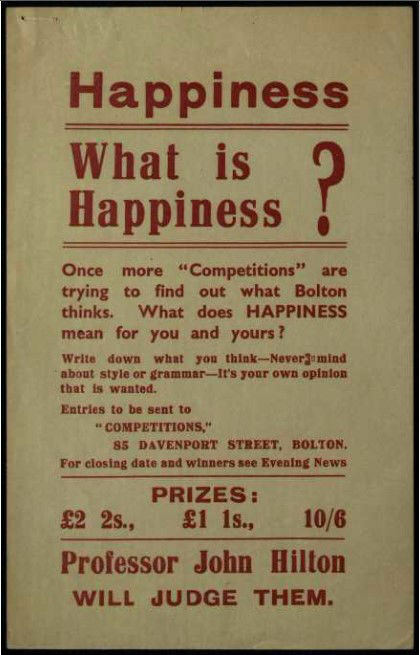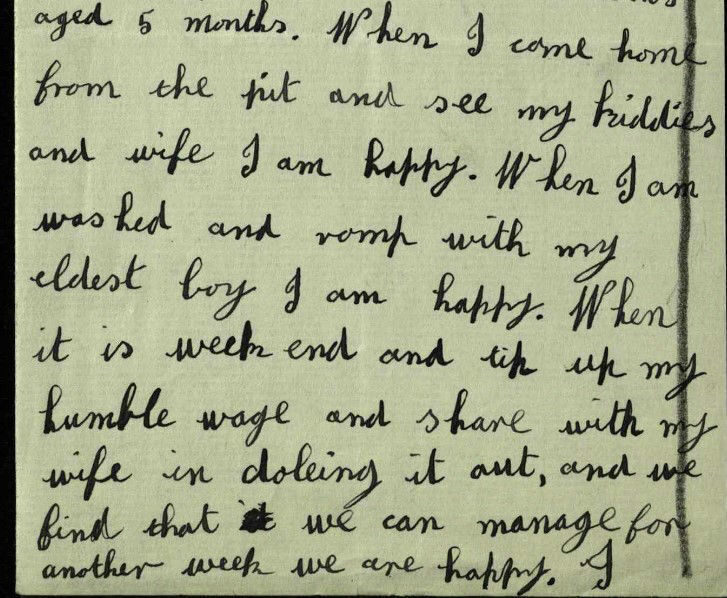What is happiness?
A pioneering social research organisation, Mass Observation, was founded in 1937 by anthropologist Tom Harrisson, film-maker Humphrey Jennings and poet Charles Madge. Their aim was to create an 'anthropology of ourselves', and by recruiting a team of observers and a panel of volunteer writers they studied the everyday lives of ordinary people in Britain. Mass Observation Online contains a vast collection of documents pertaining to social attitudes of the time.
The Topic Collection entitled ‘Happiness’ contains material relating entirely to the leaflet ‘What is Happiness?’, a survey on attitudes to happiness in the guise of a competition, organised by Professor J Hilton in 1938. The survey was conducted in the Lancashire town of Bolton.

HAPPINESS 1938, January 1938 - December 1938, © Mass Observation Archive. University of Sussex Special Collections. Further reproduction prohibited without permission.
Family, religion, and economic security feature in many replies and appear to be rooted in the idea of happiness. One heartfelt reply was written by Joseph Roberts who described happiness as:
When I come home from the pit and see my kiddies and wife I am happy. When I am washed and romp with my eldest boy I am happy. When it is the weekend and I pick up my humble wage and share with my wife in doleing [sic] it out, and we find that we can manage for another week we are happy.

HAPPINESS 1938, January 1938 - December 1938, © Mass Observation Archive. University of Sussex Special Collections. Further reproduction prohibited without permission.
Other replies are less certain of what true happiness means, and express with a sadness how happiness is often an elusive fleeting emotion. Mrs Doris Fox of Bolton sums up many responses by writing that happiness ‘is giving and feeling the joy of knowing you are making someone else feel the same’. It is interesting how so many of the responses draw on everyday life events to describe happiness considering the significant events that were happening around the world in 1938.

HAPPINESS 1938, January 1938 - December 1938, © Mass Observation Archive. University of Sussex Special Collections. Further reproduction prohibited without permission.
Can we, in modern times, relate to the same idea of happiness as a Mass Observation contributor in 1938? The papers of Mass Observation are still widely used today and have been used to form new studies on happiness. One study has compared the happiness of Bolton residents in 1938 to residents in 2014 revealing that ‘Some 76 years later, good humour and more leisure were rated above security. The most striking difference was the decline in the perceived importance of religion, which dropped from third to last on our list. It is mirrored in declining church attendance.’1
Mass Observation offers a wonderful historical perspective on what made people tick, and what made people happy, which is why many years after the original online release of Mass Observation Online, there is still a wealth of fascinating content to be discovered.
Mass Observation Online is available now. For more information, including free trial access and price enquiries, please email us at info@amdigital.co.uk.
(1) McHugh, S. (2014). The Changing Nature of Happiness. Available at http://www.historytoday.com/sandie-mchugh/changing-nature-happiness [Accessed February 2017]
Recent posts

Discover how the Mass Observation Project evolved through the 2010s. Explore societal trends, from climate change to digital shifts, revealed through module IV. Read how researchers and the public document everyday life in a changing world.

This blog spotlights Foreign Office, Consulate and Legation Files, China: Section II's material which documents China's relations with Britain, and key events such as the beginning of the Xinhai Revolution that ended centuries of imperial rule. It features correspondence between London and British diplomats stationed in Weihaiwei, the first foreign concession in China.
